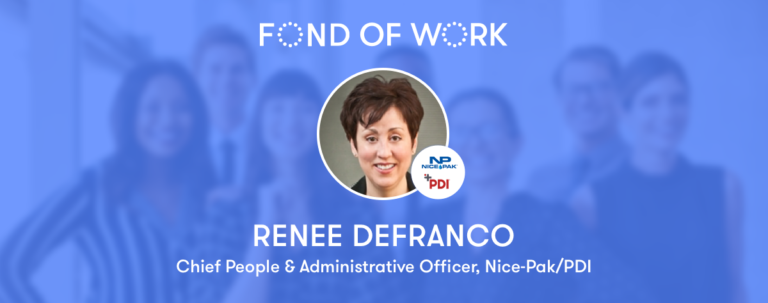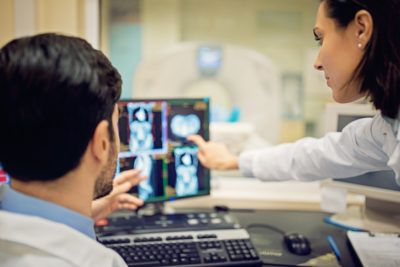
This time for Fond of Work, we spoke to Renée DeFranco, Chief People & Administrative officer at NicePak/PDI. NicePak is the largest global producer of pre-moistened wipes, including brands such as the original Wet-Nap® Moist Towelettes, Sani-Hands® Instant Hand Sanitizing Wipes, and Sani-Cloth®. PDI offers a broad range of evidence-based, market leading interventional care, environment of care, and patient care solutions, all designed to help reduce preventable infections, control healthcare costs, and help save lives.

Renée leads all aspects of the human resource function at NicePak/PDI, including the development of talent management strategies designed to build and sustain a work environment of high employee productivity, engagement, and satisfaction.
Before joining Nice-Pak/PDI, Renée worked for Advanced Health Media (AHM) as Chief Human Resources Officer. Prior to AHM, she worked for world-class organizations, including Novartis, Hewlett Packard, Chase Bank, and AlliedSignal.
Renée has an MBA in Strategic Human Resource Management and a bachelor’s degree from Fairleigh Dickinson University.
How did you first get into the HR space?
I first got into HR after working in an administrative role that included being a liaison between my department and Human Resources. It was through that role that I became more interested in the HR function and set out to network with HR folks. I eventually transitioned into an entry-level position within HR.
How did you end up at your current position?
One I entered the HR function, I spent a number of years learning the different areas of specialty. I started out in University Relations helping to build that organization and moved in and out of generalist and specialty roles within the function. I worked my way up the HR ladder into more senior level roles and eventually became the Head of HR at a small generic pharmaceuticals company.

Why are you fond of your work?
I truly enjoy partnering with business leaders to assist them with marrying organizational strategy with a people strategy that will enable the organization to achieve their stated objective. Many companies say that “people are our biggest asset” but most do not invest in their people strategies to the extent needed to grow their business and achieve higher market value. Even worse is when the organizational and people strategies are considered two separate things. One informs the other, and without both, goals will not be easily achieved.
Why do you think HR is an important department for every business to have?
Human Resources plays an important role in making an organization capable of achieving a competitive advantage through its people practices. It’s through these practices that the HR department helps to ensure the business is getting the most out of its biggest asset: their people. Effective people practices also ensure that the business operates as efficiently as possible. As a business partner, HR is critical when assisting leaders in developing an employee-oriented, productive workplace in which everyone is energized and engaged.

What is your management philosophy? How do you apply it at NicePak/PDI?
Have the right people, in the right place, at the right time and cost. I think this is the essence of a strong, healthy organization. Once the business sets its long-term strategy, HR can partner with leaders to assess the talent they have vis-a-vis that strategy, the talent they need to achieve that strategy, and identify the gap between what they have and what they need. This information can then be used to develop a workforce plan to meet the current and future capability needs of the business.
How do you reward and recognize employees?
We have a variety of ways we reward and recognize our employees beyond the typical compensation and benefit offerings. A couple of years ago, we introduced some new employee programs around flex-place/time working options as well as a paid parental leave program. These were implemented based on the feedback we received from our employees. We also introduced a rewards and recognition tool for employees and management to recognize their colleagues in real-time. As we continue to grow, evolve and hear from our employees, we will continue to address as many of their needs as we can to ensure that we maintain an environment where our employees are engaged and retained.
Why do you think employee recognition matters?
Everyone wants to be recognized for the work they do. Everyone comes to work to do a good job and be valued for the work they do — to know that what they do matters. Additionally, employee recognition plays a big role in retention. When employees feel recognized, they stick around!

What’s the best advice you’ve received in your career?
Act on fact! Many of us frequently base our business decisions on hope, fear, personally held ideologies, what others are doing, and what we have done in the past – in a nutshell, on lots of things other than the facts, and as a result, we inadvertently harm the organization.
What are some of the most pressing issues HR leaders face today?
I think some of the pressing issues revolve around the increasing use of technology (i.e., automation and artificial intelligence), differing expectations of a multi-generational workforce, and the ever-increasing cost pressures facing organizations. These pressures demand a much more flexible and agile approach to partnering with the business which, in turn, is requiring HR professionals to be more strategically aligned with both business and employee needs. This is also requiring businesses to become more efficient than ever.
What’s one thing you’ve had to learn the hard way in your career?
One thing that I’ve learned the hard way is that you must be your own advocate and own your development. Early in my career, it became clear to me that if I wanted to progress to higher levels of responsibility, I needed to identify the capabilities that were important to the situation at-hand and drive my development. Although I have received a lot of assistance from peers, co-workers, and senior leaders, they cannot develop you. However, they can guide, remove barriers, and be sounding boards.
Any advice for future HR leaders?
Do what you love and love what you do! We spend far too much time with our work families to be doing something we lack passion for!
Thank you so much to Renée for taking the time to speak with us. Stay tuned for the next interview in the Fond of Work series, coming soon! PDI is hiring, so be sure to check out their open positions.
Fond is a global SaaS platform that seamlessly consolidates employee rewards and recognition processes into one easy-to-use solution. For more information on how Fond can help you, request a demo today!
